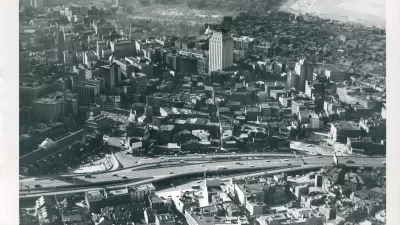The Boston Redevelopment Authority wields supreme power over the city's land use decisions, a position unique in American cities. Is it time to disband this relic of planning and development from a different era?
Born out of the urban renewal movement of the 1950s, the Boston Redevelopment Authority amassed incomparable power over zoning, planning, and development in the city. But while most other cities dismantled their urban renewal apparatus in the 1970s, Boston kept theirs, providing an invaluable resource for the city's mayors "to shape the city exactly as they want."
"The record shows that during his two decades in power, [Mayor Thomas] Menino has used the authority to create a tangled web of favors for and from certain developers, and that those relationships have been bad for Boston," writes Rachel Slade. "Much-needed housing and civic buildings haven’t been built. Characterless towers have gone up on prime waterfront lots. And planning ideas that could have transformed the city into a national model for 21st-century development have died on the vine."
"Soon we’ll have our first new mayor in a generation, which means we’ll have a rare opportunity to change how we shape this city. The BRA isn’t mowing down neighborhoods anymore, of course. That’s good. But it does continue to favor the needs of developers over those of residents, and as a result the city is gradually becoming an undistinguished jumble of stumpy towers and super blocks."
Slade implores Boston's residents to ask the city's mayoral candidates if it's time to break up the BRA.
FULL STORY: The Authority

Study: Maui’s Plan to Convert Vacation Rentals to Long-Term Housing Could Cause Nearly $1 Billion Economic Loss
The plan would reduce visitor accommodation by 25,% resulting in 1,900 jobs lost.

North Texas Transit Leaders Tout Benefits of TOD for Growing Region
At a summit focused on transit-oriented development, policymakers discussed how North Texas’ expanded light rail system can serve as a tool for economic growth.

Why Should We Subsidize Public Transportation?
Many public transit agencies face financial stress due to rising costs, declining fare revenue, and declining subsidies. Transit advocates must provide a strong business case for increasing public transit funding.

How to Make US Trains Faster
Changes to boarding platforms and a switch to electric trains could improve U.S. passenger rail service without the added cost of high-speed rail.

Columbia’s Revitalized ‘Loop’ Is a Hub for Local Entrepreneurs
A focus on small businesses is helping a commercial corridor in Columbia, Missouri thrive.

Invasive Insect Threatens Minnesota’s Ash Forests
The Emerald Ash Borer is a rapidly spreading invasive pest threatening Minnesota’s ash trees, and homeowners are encouraged to plant diverse replacement species, avoid moving ash firewood, and monitor for signs of infestation.
Urban Design for Planners 1: Software Tools
This six-course series explores essential urban design concepts using open source software and equips planners with the tools they need to participate fully in the urban design process.
Planning for Universal Design
Learn the tools for implementing Universal Design in planning regulations.
City of Santa Clarita
Ascent Environmental
Institute for Housing and Urban Development Studies (IHS)
City of Grandview
Harvard GSD Executive Education
Toledo-Lucas County Plan Commissions
Salt Lake City
NYU Wagner Graduate School of Public Service




























